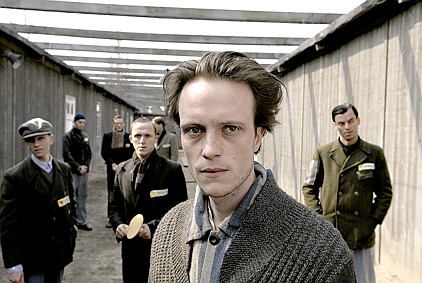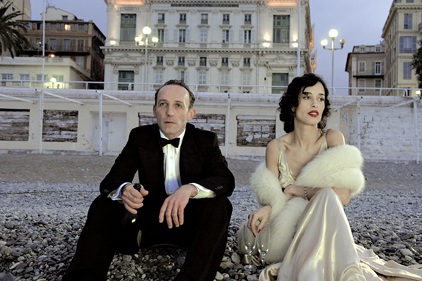LITTLE ROCK — Operation Bernhard was a Nazi plan to destabilize the economies of Great Britain and the United States during World War II by flooding those countries with forged currency produced in concentration camps. The Counterfeiters is a fictionalized account of the plot. It tells the story of Russian Jew art forger/counterfeiter Solomon Sorowitsch (Karl Markovics), who finds himself overseeing the operation.
Movie
The Counterfeiters *********
Karl Markovics plays Salomon "Sally" Sorowitsch, the king of counterfeiters in Nazi-era Berlin whose exceptional skills help him survive and advance in a concentration camp, producing fake foreign currency. Subtitled. With August Diehl, Devid Striesow, Martin Brambach; directed by Stefan Ruzowitzky. R for strong violence, sexuality/nudity, language
Sorowitsch is an extraordinarily interesting character, not least for the many ways he resembles the Nazi caricature of the conniving Jew. (The film employs quite a few stereotypes, from a sternly disapproving Prussian bank manager and a sloganeering comrade to a snarling, sadistic Nazi underling. Some of these are eventually humanized.) A bon vivant and man about Berlin with a taste for Aryan shiksas, Sorowitsch has a rattish mien and an indifference to his fellow man. He thinks the larger problem of the Jews is their reluctance to "adapt" andhas chosen to use his prodigious gifts to make forgeries because, he explains, he would rather make money than art.
He pushes his luck a little too far and is captured by ambitious police inspector Friedrich Herzog (Devid Striesow) and shipped off to the Mauthausen-Gusen labor camp. No stranger to incarceration, Sorowitsch insinuates himself into a less miserable position as the camp's artist, trading flattering portraits of SS officers and their families for scraps of bread and apple cores.
Before long he's moved to the Sachsenhausen camp near Berlin. There he is greeted by Herzog, now the camp commandant, and installed in a relatively luxurious barracks with a hand-picked team of detainees trained in the printing trades. Their mission is to produce counterfeit pounds sterling and dollars to wreck the Allies' economies.
Sorowitsch's motivation appears to be self-preservation, although he realizes that they can survive only as long as they are useful to the Nazis. If the plan succeeds and the economies collapse, their captors will surely murder them. On the other hand, if they fail, the Nazis will kill them as well. Their only option is to string the Germans along, producing enough phony bills to make the plan seem tenable. Sorowitsch is determined to take it day by day, in part because it's the only way he sees to survive but also because the project engages his professional vanity.
He's opposed by Adolf Burger (August Diehl), a communist collotype specialist who's prepared to sabotage the operation even if it costs him - and his fellow counterfeiters - their lives. (The Burger character is the only one with a historically correct name; the real Adolf Burger is still alive, and the film is based largely on his memoirs.)
The questions raised by The Counterfeiters are hardly new to considerations of the Holocaust, but they have rarely been explored in such a subtle and nuanced way by the movies. At the crux is the problem of whetherthe first duty of the individual is to survive - often superficially rendered as a choice between honor and disgrace, between courage and cowardice. But Sorowitsch is not a coward, and his motives for colluding with the Nazis are morally complex - he's also keeping his fellow inmates alive. Burger might seem to be the irresponsible one, though he's ready to martyr himself to prevent the Nazis from gaining an advantage.
Economically directed and painted in claustrophobic waxy light, The Counterfeiters won the Academy Award for Best Foreign Language Film this year.It's instructive to note that it is an Austrian-German production, and that director Stefan Ruzowitzky has admitted his grandparents were Nazi sympathizers. It is an odd product to come from a country where guilt over the Holocaust has largely been deflected (see Waldheim, Kurt), and it has been badly received in Germany, where critics charge it's too accessible and entertaining.
It's not hard to understand that view; The Counterfeiters feels more like a suspense story than an apology. It may not be possible to make a movie about such fraught events without trivializing them, but The Counterfeiters feels like an honest effort to sound painful human depths. Does one starve in solidarity with the hungry, or eat to keep one's strength, to one day fight?
MovieStyle, Pages 38 on 04/25/2008

